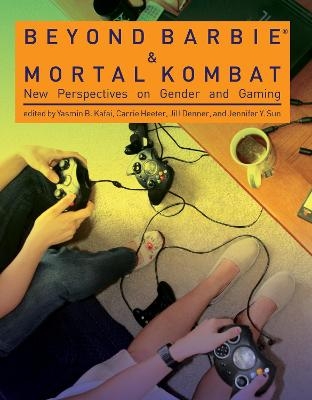
Beyond Barbie and Mortal Kombat
MIT Press (Verlag)
978-0-262-51606-8 (ISBN)
- Titel ist leider vergriffen;
keine Neuauflage - Artikel merken
Ten years after the groundbreaking From Barbie to Mortal Kombat highlighted the ways gender stereotyping and related social and economic issues permeate digital game play, the number of women and girl gamers has risen considerably. Despite this, gender disparities remain in gaming. Women may be warriors in World of Warcraft, but they are also scantily clad "booth babes" whose sex appeal is used to promote games at trade shows. Player-generated content has revolutionized gaming, but few games marketed to girls allow "modding" (game modifications made by players). Gender equity, the contributors to Beyond Barbie and Mortal Kombat argue, requires more than increasing the overall numbers of female players. Beyond Barbie and Mortal Kombat brings together new media theorists, game designers, educators, psychologists, and industry professionals, including some of the contributors to the earlier volume, to look at how gender intersects with the broader contexts of digital games today: gaming, game industry and design, and serious games. The contributors discuss the rise of massively multiplayer online games (MMOs) and the experience of girl and women players in gaming communities; the still male-dominated gaming industry and the need for different perspectives in game design; and gender concerns related to emerging serious games (games meant not only to entertain but also to educate, persuade, or change behavior). In today's game-packed digital landscape, there is an even greater need for games that offer motivating, challenging, and enriching contexts for play to a more diverse population of players.
Contributors
Cornelia Brunner, Shannon Campe, Justine Cassell, Mia Consalvo, Jill Denner, Mary Flanagan, Janine Fron, Tracy Fullerton, Elisabeth Hayes, Carrie Heeter, Kristin Hughes, Mimi Ito, Henry Jenkins III, Yasmin B. Kafai, Caitlin Kelleher, Brenda Laurel, Nicole Lazzaro, Holin Lin, Jacki Morie, Helen Nissenbaum, Celia Pearce, Caroline Pelletier, Jennifer Y. Sun, T. L. Taylor, Brian Winn, Nick YeeInterviews with Nichol Bradford, Brenda Braithwaite, Megan Gaiser, Sheri Graner Ray, Morgan Romine
Yasmin B. Kafai is Lori and Michael Milken President's Distinguished Professor at the University of Pennsylvania Graduate School of Education, coauthor of Connected Gaming, Connected Code, and Connected Play (all published by MIT Press) and other books. Carrie Heeter is Professor of Serious Game Design in the Department of Telecommunication, Information Studies, and Media, and Creative Director for Virtual University Design and Technology at Michigan State University. Jill Denner is Senior Research Associate at ETR Associates, a nonprofit agency in California. Jennifer Y. Sun is President and a founder of Numedeon, Inc., the company that launched Whyville.net, an educational virtual world targeted at children ages 8 to 14. Yasmin B. Kafai is Lori and Michael Milken President's Distinguished Professor at the University of Pennsylvania Graduate School of Education, coauthor of Connected Gaming, Connected Code, and Connected Play (all published by MIT Press) and other books. Carrie Heeter is Professor of Serious Game Design in the Department of Telecommunication, Information Studies, and Media, and Creative Director for Virtual University Design and Technology at Michigan State University. Jill Denner is Senior Research Associate at ETR Associates, a nonprofit agency in California. Jennifer Y. Sun is President and a founder of Numedeon, Inc., the company that launched Whyville.net, an educational virtual world targeted at children ages 8 to 14. Henry Jenkins is Provost's Professor of Communication, Journalism and Cinematic Arts at the Annenberg School for Communication, University of Southern California. He is the coeditor of From Barbie to Mortal Kombat: Gender and Computer Games (MIT Press, 1998). Justine Cassell is Associate Dean of the School of Computer Science at Carnegie Mellon University. Brenda Laurel is Chair of the graduate Media Design Program at Art Center College of Design in Pasadena, California and was the co-founder of Purple Moon. She is the author of Utopian Entrepreneur (MIT Press, 2001). T. L. Taylor is Associate Professor in Comparative Media Studies at MIT. She is the author of Play Between Worlds: Exploring Online Game Culture (MIT Press). Mizuko Ito is a cultural anthropologist who studies new media use, particularly among young people, in Japan and the United States, and a Professor in Residence at the University of California Humanities Research Institute. Celia Pearce is Associate Professor of Game Design and Head of the Game Design Program at Northeastern University. She is the author of The Interactive Book: A Guide to the Interactive Revolution. Artemesia is her coauthor and avatar. Mia Consalvo is Professor and Canada Research Chair in Game Studies and Design in the Department of Communication Studies at Concordia University in Montreal. She is the author of Cheating: Gaining Advantage in Video Games and Atari to Zelda: Japan's Videogames in Global Contexts, both published by the MIT Press. Elisabeth Gee is Delbert and Jewell Lewis Chair in Reading and Literacy and Professor in the Mary Lou Fulton Teachers College at Arizona State University. Mary Flanagan is Sherman Fairchild Distinguished Professor in Digital Humanities, Director of the Tiltfactor game research laboratory, and Professor in the Department of Film and Media Studies at Dartmouth College. She is the author of Critical Play: Radical Game Design (MIT Press). Helen Nissenbaum is Professor of Media, Culture, and Communication and Computer Science at New York University, where she is Director of the Information Law Institute.
| Reihe/Serie | The MIT Press |
|---|---|
| Co-Autor | Yasmin B. Kafai |
| Zusatzinfo | 36 color illus., 42 b&w illus.; 78 Illustrations |
| Verlagsort | Cambridge, Mass. |
| Sprache | englisch |
| Maße | 178 x 229 mm |
| Gewicht | 590 g |
| Themenwelt | Informatik ► Software Entwicklung ► Spieleprogrammierung |
| Informatik ► Software Entwicklung ► User Interfaces (HCI) | |
| Sozialwissenschaften ► Soziologie ► Gender Studies | |
| ISBN-10 | 0-262-51606-3 / 0262516063 |
| ISBN-13 | 978-0-262-51606-8 / 9780262516068 |
| Zustand | Neuware |
| Haben Sie eine Frage zum Produkt? |
aus dem Bereich


